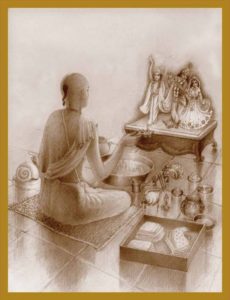
This subject is an extension of a frequent topic of mine which I deal with on a daily basis: extolling the virtue of introspection and self-analysis as part of clearing out impediments to devotion in the stage of bhakti called anartha-nivritti (retiring unwanted habits of thought and action)–such anartha’s are often the source of many of our problems. We live in a time of busy-ness and addiction to innumerable distractions, where it isn’t seen as cool to just be sitting down without a handheld device, something to do, or talkative friends, and thus introspection is not usually a conscious desirable activity for most people, including devotees!
I remember once on a busy street being taken by the beauty of a particular cloud formation and stopping to stare upward, where the comments I heard from passersby were about my being on drugs or exhibiting unusual, curious behavior to be looking up at the sky, as if their personal business of walking somewhere, talking on their cell phone, or hanging out with no real purpose, was the only important activity, and my looking at a cloud was deranged tomfoolery.
Though we are social creatures that need interaction with others in good spiritual association, the importance of being alone with one’s thoughts or taking the time to reflect on life is crucial. Some people aren’t comfortable being alone or don’t know what to do with themselves or how to use the time other than to watch someone else living their dream on T.V or in a movie, or to sleep, play a game of solitaire, or lament they don’t have a friend to be with, or something “fun” to do, etc. I doubt there is a class in school on how to be alone and be happy, or how to sit in nature and observe, or in general, “being,” rather than doing.
Those on the bhakti path can always chant or read and have lots of service to do, and yet, in my experience, being able to be alone and to think with no distractions (like our IPhone or Facebook!) or external engagements is so beneficial. Keeping a journal can help one be more internal and understand ourselves better and what we truly want and require for today, tomorrow, and the long haul of our lives. Without this we may feel carried away by the current of life, thinking that our life is out of control, or that we aren’t satisfied. We need time alone and to be undistracted to sort our important concerns.
Spending time by ourselves is also a way to take a timeout from life’s demands, and can be a way to recharge or regroup, especially in a place of scenic beauty. Alone, we can talk to Krishna and pray for guidance, and be peaceful enough to be receptive to hear or sense inner direction. Personally, when I am “alone,” I remember Krishna and talk to him of my mixed position as a motivated devotee, and how I require his mercy to rise above my conditioning. I love to do this before our Deities, as I do every morning to wake them and chant, appreciating their sublime beauty and wondrous mercy to have come to bless us. In that sense being alone can be an opportunity to “practice the Presence of God,” or feel our connection with both our soul and our “Maker.”
When we are comfortable being alone and in touch with our best selves in our current life situation, we will be better persons and more satisfied when we’re with friends or interacting with others. I have gradually found in the solitude of sadhana, or spiritual practices, and in country living (backed by years of reading from many wise living persons, and from the ancient but timeless wisdom in scriptures and from saints) that we aren’t our past trauma, labels from our upbringing, or the opinions of others, but we’re a pure soul having a human experience. As a result of being at peace within ourselves we will have much to offer others just by being present so we can listen well and thoughtfully observe, remembering we’re servants of Krishna, and practicing being kind, caring, understanding, compassionate, and encouraging. With such good qualities, people will be more open-hearted towards us in return, and inclined to hear knowledge of the soul and God when we discover a teachable moment.
We can be our best self in the world, or be situated in what my wife and I call our “authentic illusory self” (best conditioned self) while doing our spiritual practices to awaken our eternal self or soul through the mercy of bhakti given by our gurus blessed by our previous acharyas and Shri Chaitanya and Shri Nitai. To me, this is making the best of both worlds, and if we can do so, we will be satisfied physically, mentally, and emotionally that we used our natural skills and desires in the service of Krishna (God) in a way that also serves our family, community, and greater family of the Earth. This is real balance and sustainability for the long haul of a life of devotion!
Although Gandhi’s statement that we have to be the change we want to see, may seem cliche to some, I see it as an important goal for those aspiring for higher consciousness and compassion. To me, the question is only how large or small our field of involvement is and whether our vision of change is sustainable and realistic. Bigger is not necessarily better, but being a better version of ourselves in integrity with our highest values is always a desirable and worthy endeavor.
Post view 660 times



Leave a Reply